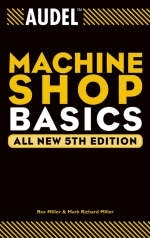
Audel Machine Shop Basics
Audel (Verlag)
978-0-7645-5526-8 (ISBN)
Use the right tool the right way
Here, fully updated to include new machines and electronic/digital controls, is the ultimate guide to basic machine shop equipment and how to use it. Whether you're a professional machinist, an apprentice, a trade student, or a handy homeowner, this fully illustrated volume helps you define tools and use them properly and safely. It's packed with review questions for students, and loaded with answers you need on the job.
Mark Richard Miller is a Professor and Chairman of the Industrial Technology Department at Texas A&M University in Kingsville, Texas.
* Understand basic machine shop practice and safety measures
* Recognize the variations in similar tools and the purposes they serve
* Learn recommended methods of mounting work in different machines
* Obtain a complete working knowledge of numerically controlled machines and the operations they perform
* Review procedures for safe and efficient use of cutting tools and cutters
* Expand your knowledge with clear, step-by-step illustrations of proper equipment set-up and operation
Rex Miller was a Professor of Industrial Technology at The State University of New York, College at Buffalo for over 35 years. He has taught on the technical school, high school, and college level for well over 40 years. He is the author or co-author of over 100 textbooks ranging from electronics to carpentry and sheet metal work. He has contributed more than 50 magazine articles over the years to technical publications. He is also the author of seven civil war regimental histories. Mark Richard Miller finished his BS degree in New York and moved on to Ball State University, where he obtained a master’s degree and went to work in San Antonio. He taught in high school and went to graduate school in College Station, Texas, finishing a doctorate degree. He took a position at Texas A&M University in Kingsville, Texas, where he now teaches in the Industrial Technology Department as a Professor and Department Chairman. He has co-authored seven books and contributed many articles to technical magazines. His hobbies include refinishing a 1970 Plymouth Super Bird and a 1971 Roadrunner. He is also interested in playing guitar, an interest he pursued while in college as the lead guitarist of a band called The Rude Boys.
Acknowledgments xi
About the Authors xiii
Introduction xiv
Chapter 1: Benchwork 1
The Bench and Bench Tools 1
Vises 2
Hammers 3
Chisels 5
Flat Chisel 5
Cape Chisel 8
Diamond-Point Chisel 8
Round-Nose Chisel 9
Hacksaws 10
Files 11
How to File 11
Drawfiling 15
File Characteristics 17
Scrapers 20
How to Use a Scraper 21
Scraper Classifications 23
Summary 23
Review Questions 24
Chapter 2: Precision Measurement and Gaging 27
Micrometer Calipers 27
Vernier Micrometer Calipers 29
Vernier Calipers 31
Bevel Protractors 34
Dial Indicators 38
Gages 39
Surface Gage 40
Height Gage 42
Depth Gage 43
Snap Gage 43
Plug Gage 44
Ring Gage 45
Taper Gage 45
Center Gage 47
Screw-Pitch Gage 47
Tap and Drill Gage 49
Thickness or Feeler Gage 49
Wire Gage 50
U.S. Standard Gage for Sheet and Plate Iron and Steel 51
Effects of Temperature and Weight on Precision Tools 51
Electronic Caliper Depth Gages 55
Electronic Digital Micrometer 58
Summary 58
Review Questions 60
Chapter 3: Materials 63
Properties 63
Desirable Properties 63
Definition of Properties 63
Metals 65
Ferrous Metals 65
Nonferrous Metals 70
Refractory Metals 71
Nonferrous Alloys 73
Nonmetals 76
Tests of Materials 76
Elasticity and Plasticity 76
Stress and Strain 77
Tensile Strength 77
Ductility 77
Toughness 77
Hardness 78
Portable Hardness Tester 78
Brittleness 82
Relationship between Mechanical Properties and Hardness 82
Effects of Temperature 83
Summary 84
Review Questions 85
Chapter 4: Abrasives 89
Structure of Abrasives 89
Natural Abrasives 89
Manufactured Abrasives 90
Composition of Abrasives 90
Silicon Carbide 91
Aluminum Oxide 91
Diamonds 91
Use of Abrasives in Grinding Wheels 92
Silicon Carbide Abrasives 92
Aluminum Oxide Abrasives 93
Diamond Abrasive 94
Summary 94
Review Questions 95
Chapter 5: Grinding 97
Manufacture of Grinding Wheels 97
Natural Grindstones 97
Manufactured Abrasive
Grinding Wheels 97
Bond Types in Grinding Wheels 101
Vitrified-Bond Grinding Wheels 101
Organic-Bonded Grinding Wheels 102
Silicate-Bonded Grinding Wheels 105
Grinding Wheel Markings 105
Abrasive Type 106
Grain Size 106
Grade 106
Structure 106
Bond or Process 107
Bond Modification Symbols 107
Factors Affecting Grinding Wheel Selection 107
Hardness of Material to Be Ground 108
Amount of Stock to Be Removed and Finish Required 108
Operation (Wet or Dry) 108
Wheel Speed 108
Area of Grinding Contact 109
Severity of Grinding Operation 109
Summary 110
Review Questions 110
Chapter 6: Cutting Fluids 113
Coolant 113
Lubricants 113
Application of Cutting Fluids 113
Types of Cutting Fluids 114
Solid Lubricants 115
Summary 117
Review Questions 118
Chapter 7: Cutting Tools 119
Action of Cutting Tools 119
Materials 119
Shapes and Uses of Cutting Tools 120
Terms Related to Cutting Tools 121
Cutting Tool Angles 123
Tool Angles 123
Working Angles 128
High-Speed Steel Lathe Tools 130
Summary 135
Review Questions 136
Chapter 8: Cutter and Tool Grinders 137
Importance of Tool Sharpening 137
Cutter and Tool Sharpening 137
Lathe and Planer Tools 138
Twist-Drill Sharpening 138
Regrinding Tap Drills 143
Mounted Points and Wheels 144
Cutter-Sharpening Machines 144
Summary 149
Review Questions 149
Chapter 9: Drills 151
Drill Standards 151
Twist Drill Terminology 153
Types of Drills 157
Shank 157
Body 157
Point 161
Drill-Bit Point Design 163
Special-Purpose Drills 163
Socket and Sleeve 165
Using the Twist Drill 167
Secure the Work 167
Cutting Oil 167
Speeds and Feeds 167
Clearance Drills 176
Drill Problems and Causes 178
Summary 179
Review Questions 179
Chapter 10: Reamers 181
Types of Reamers 181
Hand Reamers 181
Machine Reamers 184
Use and Care of Reamers 192
Summary 193
Review Questions 194
Chapter 11: Taps 195
Types of Taps 195
Hand Taps 195
Machine-Screw Taps 202
Pipe Taps 205
Nut Taps 207
Pulley Taps 207
Taper Taps 207
Special-Purpose Taps 208
Tap Selection 209
Classes of Thread 210
Summary 212
Review Questions 213
Chapter 12: Threading Dies 215
Types of Dies 215
Solid Dies 215
Round-Split Dies 217
Two-Piece Adjustable Dies 218
Acorn Dies 218
Use of Dies to Cut Threads 220
Summary 222
Review Questions 223
Chapter 13: Milling-Machine Cutters 225
Milling Operation 225
Classification of Milling Cutters 226
General Types of Milling Cutters 226
Plain Milling Cutters 226
Side Milling Cutters 229
End Mills 231
Angle Milling Cutters 234
Slitting Saws, Slotting Saws, and Miscellaneous Cutters 235
Form-Relieved Cutters 239
Hobs 241
Care of Milling Cutters 242
Speeds and Feeds 242
Speeds 243
Feeds 246
Summary 250
Review Questions 250
Chapter 14: Milling-Machine Arbors, Collets, and Adapters 253
Arbors 253
Styles of Arbors 254
Methods of Driving the Cutters 255
Collets 257
Adapters 258
Summary 259
Review Questions 259
Chapter 15: Broaches and Broaching 261
Broaching Principle 261
Types of Broaches 262
Shapes of Broaches 262
Internal and External Broaches 263
Pull or Push Broaches 264
Care and Sharpening of Broaches 264
Broaching Machines 265
Broaching Operations 268
Pull Broaching 268
Push Broaching 268
Surface Broaching 269
Round Broaching 269
Summary 270
Review Questions 270
Chapter 16: Electrical Safety in the Machine Shop 273
Power Sources 273
Three-Phase Power 273
Power Panels 275
Raceways and Cable Trays 275
Motor Problems 278
Three-Phase Motor Symptoms 282
DC Motors 284
Motor Lubrication 286
Drum Switches 286
Safety in the Shop 288
Fire Extinguishers 288
Summary 288
Review Questions 292
Appendix: Reference Materials 293
Miscellaneous Useful Facts 293
Metric Conversions 294
Metric and English Equivalent Measures 295
Length 295
English Conversion Table 296
Standard Metric to English Conversions 297
Water Factors 300
Weights of Steel and Brass Bars 301
Index 303
| Erscheint lt. Verlag | 30.1.2004 |
|---|---|
| Reihe/Serie | Audel Technical Trades Series |
| Zusatzinfo | Photos: 275 B&W, 0 Color; Drawings: 36 B&W, 0 Color; Tables: 21 B&W, 0 Color |
| Sprache | englisch |
| Maße | 132 x 208 mm |
| Gewicht | 295 g |
| Themenwelt | Technik ► Maschinenbau |
| ISBN-10 | 0-7645-5526-X / 076455526X |
| ISBN-13 | 978-0-7645-5526-8 / 9780764555268 |
| Zustand | Neuware |
| Informationen gemäß Produktsicherheitsverordnung (GPSR) | |
| Haben Sie eine Frage zum Produkt? |
aus dem Bereich


